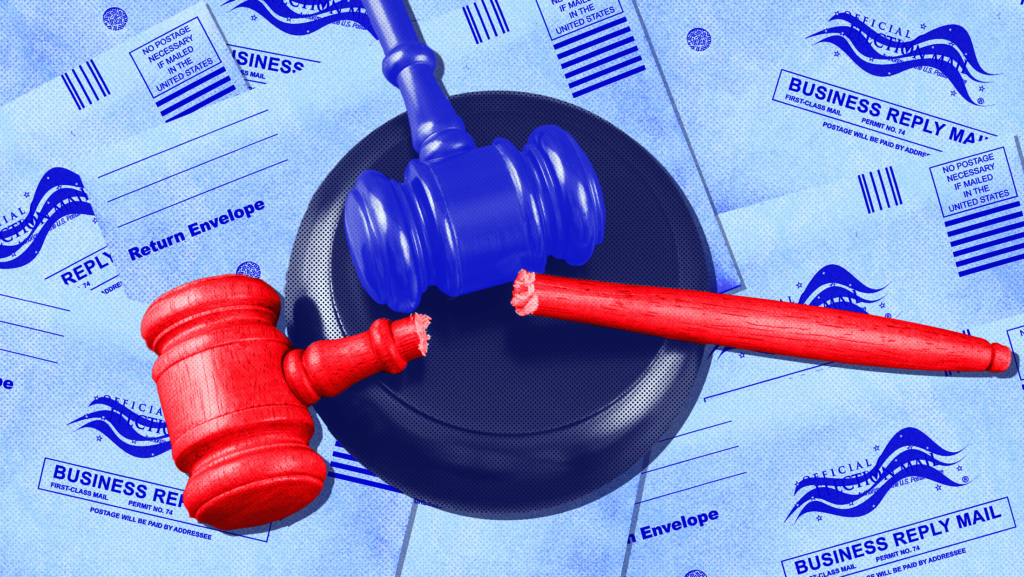Republicans are Losing the Vote-By-Mail Battle in Court

Former President Donald Trump and his fellow Republicans have switched their positions on mail-in voting so many times that it would give any voter whiplash. Whether they claim to support it as a valid voting method or disparage it as a vehicle for election fraud, the GOP lawsuits don’t lie. The Republican Party is staunchly anti-mail voting.
The Republican National Committee (RNC), along with GOP figures at the state level, have filed continuous lawsuits challenging states’ mail-in voting policies, trying to make it harder for voters to return their absentee ballots and rejecting large numbers of votes. Despite this clear push to pursue cases on this issue, Republicans are losing the vote-by-mail battle in courts across the country.

Democracy Docket has been tracking GOP mail-in voting cases during the 2024 election cycle, and according to our data, Republicans have won five cases and lost 20.
There are dozens of lawsuits filed this cycle that aimed at expanding or restricting mail-in voting.
Democracy Docket is the only news outlet tracking and reporting on all of these cases — sign up for our free daily and weekly newsletters to get the latest updates sent straight to your inbox.
Some of these mail-in voting lawsuits were filed by national and/or state Republicans targeting states’ pro-voting policies and others were brought by Democrats challenging GOP voter suppression laws. We categorized them as wins and losses based on the courts’ actions.
A GOP win: Republicans win their case or Democrats lose their case.
A GOP loss: Republicans lose their case or Democrats win their case.
The victories and losses are not just for cases that have already been decided and have officially concluded; they account for any victory or loss a court delivers in a case.
In one case, Stefanik v. Hochul, Republicans have been handed three losses by courts.
Last fall, the RNC and other Republican groups challenged the New York Early Mail Voter Act. The law, signed in September of 2023 by New York Gov. Kathy Hochul (D), allows all registered voters to vote by mail during the early voting period. Previously in the state, voters had to provide an excuse as to why they had to vote by mail.
In their lawsuit, the Republicans argued the New York Constitution enumerates two classes of voters who can vote using absentee ballots — those who are out of town on Election Day and those who have an illness or physical disability — and the new law applies to voters outside of those two groups.
The GOP plaintiffs lost in a trial court, an appellate court and ultimately the state’s highest court — the New York Court of Appeals — which upheld the law on Aug. 20, rejecting the Republican challenge.
In another notable mail-in voting case, Republicans received both a win and a loss. In Genser v. Butler County Board of Elections, two voters in Butler County, Pennsylvania sued the Butler County Board of Elections on April 29 for its decision to reject their provisional ballots after they originally submitted mail-in ballots without an inner secrecy envelope, known as “naked ballots.”
The voters argued the election board violated state election law by denying them the opportunity to cure or correct their invalid mail-in ballots. The Pennsylvania Democratic Party intervened in the case on behalf of the voters, and the RNC and state GOP intervened on behalf of the county election board.
On Aug. 16, a court ruled in favor of the defendants and dismissed the case, prompting the plaintiffs to appeal to the Commonwealth Court. This was a win for the GOP.
Then, on Sept. 5, the Pennsylvania Commonwealth Court reversed the trial court’s ruling, meaning Butler County voters will be able to cast a provisional ballot at their polling place if their mail-in ballot is missing an inner secrecy envelope. This was a loss for the GOP.
The Republican plaintiffs appealed the Commonwealth Court’s ruling to the Pennsylvania Supreme Court on Sept. 8.
With less than two months until the 2024 election, Republicans have only increased the number of anti-voting lawsuits they’re filing in swing states, including ones continuing to target mail-in and absentee voting.
On Thursday, the RNC and Michigan GOP sued Michigan Secretary of State Jocelyn Benson (D) over what they allege is “incomplete” guidance from her office on how election clerks should verify absentee ballots.
If they continue to lose most of their mail-in voting cases as they have this cycle then voters casting mail-in ballots won’t face additional barriers to voting. However, there’s still plenty of time for courts to issue decisions leading up to November, so voters must wait and see how the remaining cases unfold.